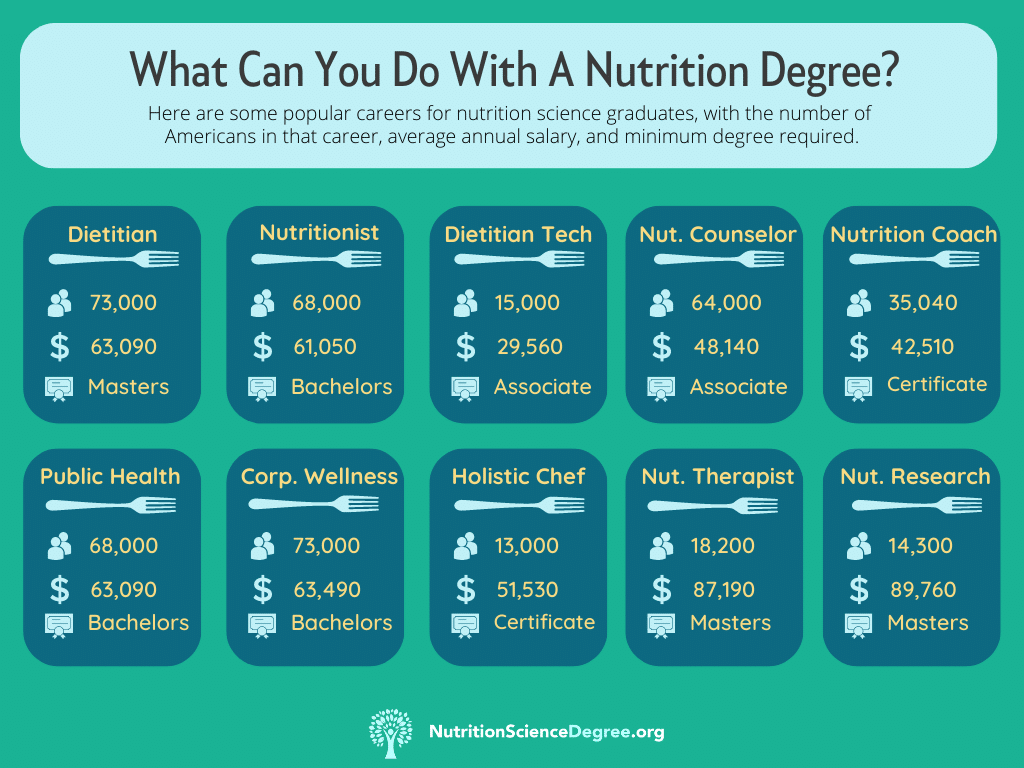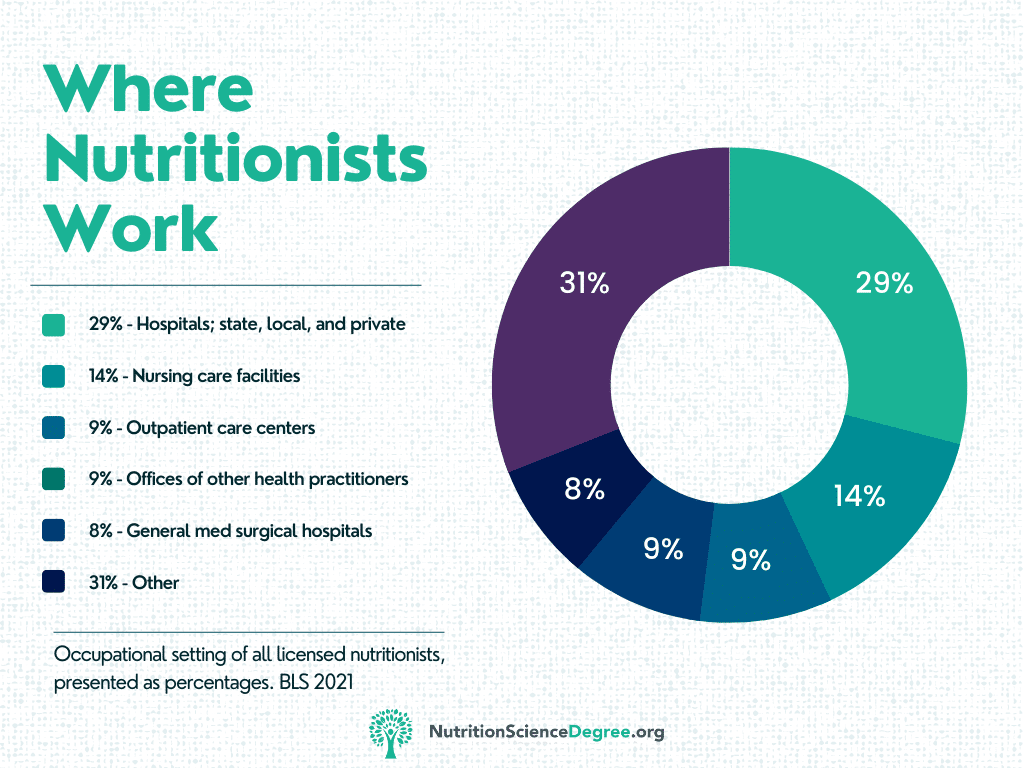
Nutrition Career Overview
More Answers From Nutritionist Degree Graduates
Did You Know?
Nutrition jobs are expected to grow 8% by 2031, faster than the national average.
Career Overview
What Can You Do With A Degree in Nutrition Science?
A degree in nutrition science prepares you for a wide range of careers.
Here is a list of some of the more common nutrition science degrees online and in-person:
- Clinical Nutritionist: As a clinical nutritionist, you can work in hospitals, clinics, and other healthcare settings, providing nutrition assessments, counseling, and education to patients with various health conditions. You’ll work with doctors, nurses, and other healthcare professionals to develop individualized nutrition plans that meet the unique needs of each patient.
- Sports Nutritionist: As a sports nutritionist, you can work with athletes and fitness enthusiasts to optimize their performance through proper nutrition. You’ll develop personalized nutrition plans for athletes based on their specific sport, training schedule, and goals, and help them fuel their bodies for optimal performance.
- Community Nutritionist: As a community nutritionist, you can work in public health settings, such as government agencies, non-profit organizations, and community health centers, to promote healthy eating habits and prevent chronic diseases through nutrition education and outreach programs.
- Food Scientist: As a food scientist, you can work in the food industry to develop new and innovative food products that meet consumer demand for healthy and sustainable foods. You’ll use your knowledge of nutrition and food science to create products that are not only delicious, but also nutritious and beneficial for human health.
- Nutrition Researcher: As a nutrition researcher, you can work in academic settings, government agencies, or private research institutions, conducting research studies to advance our understanding of the relationship between nutrition and human health. You’ll design and conduct experiments, analyze data, and publish research findings that inform public policy and improve the health of individuals and populations.
Who Are The Largest Employers For Nutritionists and Dietitians in the US?
The largest employers of nutritionists and dietitians in the United States are:
- 29% Hospitals; state, local, and private: Employed 29% of nutritionists and dietitians with an average salary of $63,090 per year.
- 14% Nursing care facilities (skilled nursing facilities): Employed 14% of nutritionists and dietitians with an average salary of $63,760 per year.
- 9% Outpatient care centers: Employed 9% of nutritionists and dietitians with an average salary of $63,420 per year.
- 9% Offices of other health practitioners: Employed 9% of nutritionists and dietitians with an average salary of $64,580 per year.
- 8% General medical and surgical hospitals: Employed 8% of nutritionists and dietitians with an average salary of $63,750 per year.
What Is The Employment Outlook For Nutritionists and Dietitians?
The employment outlook for nutritionists and dietitians in the US is good. According to the BLS, employment of nutritionists and dietitians is projected to grow 8% from 2019 to 2029, which is much faster than the average occupation.
This faster than average growth is due in part to an increasing public emphasis on disease prevention and the importance of healthy eating habits. Additionally, the aging baby boomer population will likely increase demand for nutrition services as they seek to maintain their health and manage chronic conditions. And in general society has been making greater efforts to combat obesity in both children and adults. With these concerns in mind, it is no wonder that the need for more research regarding nutrients’ effect on the body has increased and that the demand for nutritionists and dietitians is continuously growing.
What are the career steps to become a nutritionist or dietitian?
Generally speaking, an online nutrition degree (or in-person) typically requires the following:
- High school diploma or equivalent: Most nutrition science undergraduate degree programs require students to have a high school diploma or equivalent, such as a GED.
- Complete Prerequisite courses: If you’re transferring in from, say, a community college or an associates program, many bachelors nutrition science programs require students to complete certain prerequisite courses, such as biology, chemistry, and anatomy and physiology, before they can begin their major coursework.
- Complete Core coursework: The core coursework for a bachelors degree in nutrition science typically includes classes in nutrition science, food science, and related subjects like biochemistry, metabolism, and human development.
- Complete Elective coursework to prepare for career: Depending on the program, students may also have the opportunity to take elective coursework in areas such as public health, community nutrition, or sports nutrition, which can help them learn about careers in nutrition science and decide if they are a good fit for them.
- Complete Fieldwork or internship: Many nutrition science bachelor’s programs require students to complete a certain number of hours of supervised fieldwork or an internship in order to gain practical experience working with clients or in a professional setting.
- Potential Master’s degree: Depending on the career goals of the student, you may choose to pursue aMaster’s degree in nutrition science. Master’s degree can take an additional 1-2 years but can qualify you for a wider range of nutrition science related careers.
- Potential Certification: In many states, nutritionists are required to be licensed or certified to practice. The specific requirements for certification can vary by state, but they often involve completing a minimum level of education and experience, and passing a state-specific exam. Some states also require nutritionists to hold a specific credential, such as the Certified Nutrition Specialist (CNS) credential offered by the Board for Certification of Nutrition Specialists (BCNS). This credential requires completion of a master’s or doctoral degree in nutrition, a certain amount of supervised experience, and passing an exam.
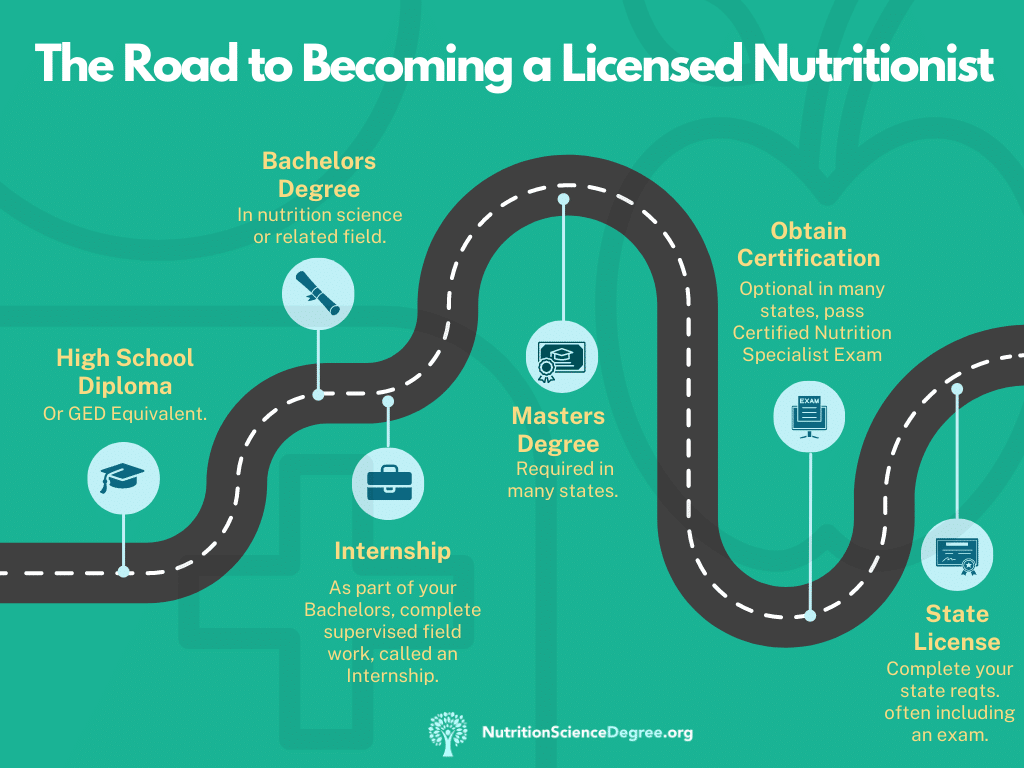
What Are The Internship and Externship Requirements for Nutritionists?
Many careers related to nutrition science require students to complete an internship (sometimes called a practicum) or externship before they can be licensed. These requirements are different by both the state and the credentialing organization applicable to your preferred career. To give you an idea of what those requirements look like, however, here are the requirements for those interested in becoming a licensed nutritionist or registered dietitian.
Registered Dietitian Nutritionist Internship Requirement:
To become an RDN, students must complete a dietetic internship program that is accredited by the Accreditation Council for Education in Nutrition and Dietetics (ACEND). These internships typically last 6-12 months and require students to complete a certain number of hours in supervised practice in various settings, such as hospitals, clinics, and community programs. During the internship, students are typically required to complete a variety of rotations in areas such as clinical nutrition, community nutrition, and food service management. In addition to the internship, students must also pass the national Registered Dietitian Nutritionist (RDN) exam in order to become credentialed.
Licensed Nutritionist Internship Requirement:
Licensed nutritionists, on the other hand, may have different requirements depending on the state.
Some states require a certain number of supervised practice hours in a clinical or community setting, while others may require a graduate degree in nutrition or a related field. It’s important for students to research the specific requirements in their state if they are interested in becoming a licensed nutritionist.
What Are The Steps to Become a Registered Dietitian?
Becoming a registered dietitian means, by definition, that you’ve received the Registered Dietitian Nutritionist (RDN) credential. The Registered Dietitian Nutritionist (RDN) credential is administered by the Commission on Dietetic Registration (CDR), which is the credentialing agency for the Academy of Nutrition and Dietetics. So, in order to become an RDN, you must meet the following requirements:
- Education: Completion of a campus or online bachelor’s nutrition degree, or a related field, from an accredited college or university.
- Note: While almost all accredited nutrition degree programs do, confirm that your school’s nutrition degree curriculum should meet the coursework requirements for the Didactic Program in Dietetics (DPD), as this is a requirement of the CDR.
- Dietetic Internship: Complete an ACEND-accredited dietetic internship program, which includes a minimum of 1,200 hours of supervised practice in clinical, community, and foodservice management settings.
- Note: Often this is part of your college’s nutrition degree program, but if not, you’ll need to complete this.
- RDN Exam: Successful completion of the national RDN exam, which is administered by CDR.
- Continuing Education: Maintenance of RDN credential through continuing education requirements, which must be completed every 5 years.
What Are The Steps To Become A Licensed Nutritionist?
Each state regulates and licenses nutritionists differently, but the majority of states require that licensed nutritionists be certified as either Registered Dietitian Nutritionists (RDN) or Certified Nutrition Specialist (CNS) to call themselves ‘Nutritionists’. The requirements for these two major certifications and the states that each certification applies to are below:
Registered Dietitian Nutritionist (RDN)
States That Require It:
Alabama, Connecticut, Delaware, District of Columbia, Florida, Illinois, Kentucky, Louisiana, Mississippi, Montana, New Mexico, New York, North Carolina, Pennsylvania, Rhode Island, South Dakota, Tennessee, Virginia, Washington D.C., Washington State
Administered By:
The Commission on Dietetic Registration (CDR)
Requirements:
- Nutritionist Degree: Accredited Bachelors in Nutrition or Dietetics Degree
- Internship: 900 – 1,200 Hours of Supervised Practice (Internship)
- Continuing Education: 75 Hours Continuing Education Every 5 Years.
Certified Nutrition Specialist (CNS)
States That Require It:
Maryland, Massachusetts, New York, Pennsylvania
Administered By:
American Nutrition Association
Requirements:
- Nutritionist Degree: Masters in Nutrition or Dietetics (or in a closely related field)
- Internship: 900 – 1,000 Hours of Supervised Practice (Internship)
- Continuing Education: 75 Hours Continuing Education Every 5 Years.
What Our Experts Say About Online Nutrition Degree Programs
To become a registered dietitian, you have to get your bachelor’s degree. Generally it’s in something related like human nutrition and food science, dietetics, and then after that, you are matched to a dietetic internship. So it’s an accredited internship with, you know, often with a university.

Getting a nutrition degree online,post COVID, there’s lots of options. And if that’s an option that appeals to you because of where you live geographically, because of financial constraints, because you’re working another job while you’re seeking your degree. I don’t know that nutrition and getting a nutrition degree online is any less than going to a university in-person environment for that level, if that’s something that you’re more comfortable doing.

It certainly can do a nutrition science degree online. I would say some advantages are that this is kind of where we’re seeing healthcare go in general, even working in a hospital myself, a lot of my patients that I see are still seen online and on the computer. So this is a platform that’s definitely going to be in our future, and we’re not getting rid of. You’re kind of getting yourself experience working in that regard.

Explore More
Nutritionist and Dietitian Salary Information
Before we begin, it is important to note that there is a difference between nutritionists and dietitians. While each career is responsible for distinct tasks, much of the data pertaining to the salaries are similar. This is why we are using the BLS’s combined salary information for this guide. There are several factors that play into your potential salary such as level of education, industry, experience, and location of where you work.
The BLS reported that most salaries for nutritionists and dietitians ranged from $35,240 – $80,950, with the median being $57,910 in 2015. With such a large range to account for, it makes sense that your education and where you choose to work and live can have a great impact on your salary.
There is no specific correlation provided by the BLS between salary and education as it pertains to the field of nutrition science. However the 2015, BLS graph below illustrates that obtaining higher levels of education typically translates into higher weekly earnings and lower unemployment rates for almost all occupations nation-wide.
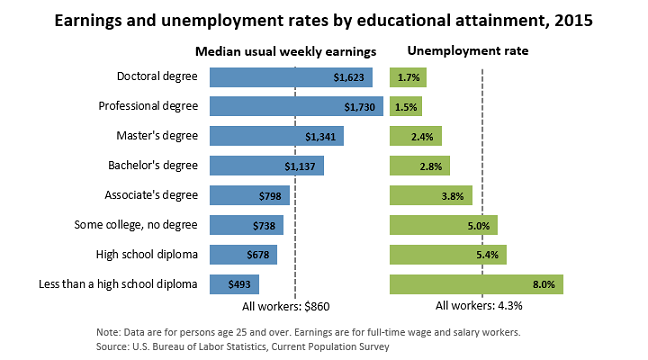
Using the information that the BLS has provided, nutritionists and dietitians earn about as much as what is reported in the “Bachelor’s degree” line of this bar graph. Therefore if you plan on pursuing education beyond a bachelor’s degree, you may have a greater chance of exceeding the BLS’s reported earnings for this field.
Salary By Industry
As we mentioned, the industry you work in can play a large role in determining what kind of salary you can expect to receive. Nutritionists and dietitians can work in a plethora of industries like government, education, research, consultations/private practices, healthcare, corporations, and the list goes on. The following is a list of the on-average, highest paying industries (according the BLS) for nutritionists and dietitians as of 2015:
- Grant-Making and Giving Services – $73,100
- Grocery and Related Product Merchant Wholesalers – $70,920
- Federal Executive Branch – $70,370
- Business, Professional, Labor, Political, and Similar Organizations – $70,060
- Home Health Care Services –
It is always nice to make as much as you possibly can, but it is also important to simply have a job. The chart below showcases the industries and the average salaries that have the highest concentration of dietitians and nutritionists.

As you can see, many nutritionists and dietitians work in hospitals, outpatient centers, or nursing care facilities, and they are referred to as clinical nutritionists and clinical dietitians. Most non-clinical professionals in this field are referred to as community dietitians and community nutritionists, and they work in industries such as health maintenance organizations (HMOs), non-profits, and government agencies.
Salary By Location
No matter which industry you want to work in as a nutrition scientist, it is always important to do your research and make sure that where you live can support your career goals. Luckily nutritionists and dietitians are needed all over the country, but there are several areas that hire and/or pay more than other states, cities, or towns. For example, California is known for having a health-conscious culture. As a result, you’ll see that the BLS lists California as both the state with the highest employment level and highest pay in the country. Even if a state does not necessarily have a reputation for focusing on healthy lifestyle choices, does not mean that they do not value the contributions made by the nutrition science field. Other high-employment level states are illustrated in the darkest shade of green in the map below.
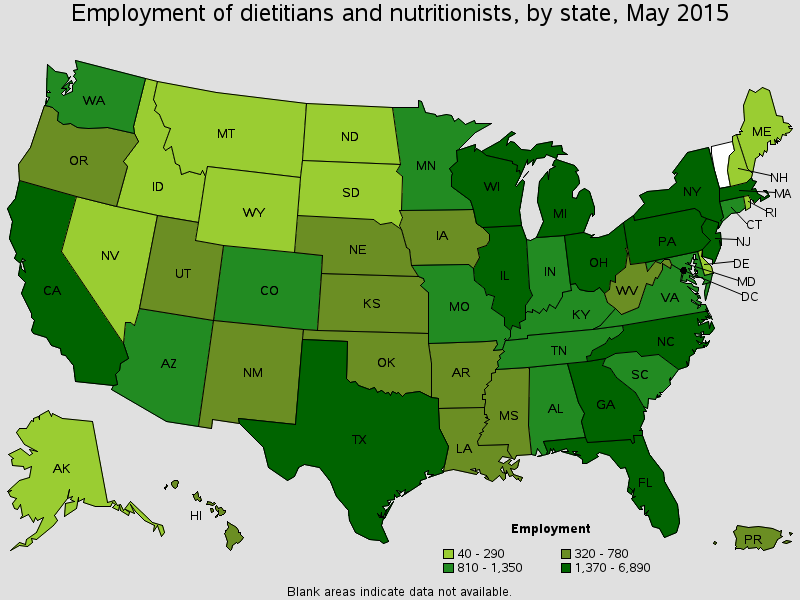
The top states and average annual salaries from the above map are as follows:
- California: $72,320
- New York: $62,960
- Texas: $57,570
- Florida: $55,920
- Pennsylvania: $54,790
Pursuing your career with a job that pays is great, but having a a job that pays well is even better. We’ve mentioned that your education, experience, and industry are factors that contribute to your salary. However, where you live can have the largest impact on your salary potential. These are the top five highest paying states as listed by the BLS in 2015.
- California: $72,320
- Alaska: $67,760
- New Jersey: $65,430
- Hawaii: $65,150
- Oregon: $65,090
Do you prefer living the city life with all of the hustle and bustle, or slowing down in a less-populated area? There’s no wrong answer! If you’re unsure, the chart below compares the average salaries of the highest paying cities (metropolitan) versus the highest paying suburban/rural areas (nonmetropolitan) as of 2015.
| Top Paying Metropolitan Areas for Nutritionists and Dietitians | Top Paying Nonmetropolitan Areas for Nutritionists and Dietitians |
|---|---|
|
|
Source: BLS Occupational Employment Statistics, Dietitians and Nutritionists’ Geographic Profile – 2015
Nutritionists and dietitians are among some of the fastest growing careers in the nation. Whether you are looking into online nutrition science degree programs or entering the professional workforce, you can have an abundance of career and salary opportunities to look forward to. Nutrition science is one of the few fields with the potential for a great paycheck and the ability to allow you to help our society make smarter, healthier choices. Check out our guide, 100 Must-Bookmark Sites on Nutrition Science and explore the rest of our website to learn more about how you can start your career in the nutritional sciences.

